Development of Sustainable Agriculture
Capacity Building of Poor and Marginalized Farmers:
MTRDS conducted awareness and capacity building programs on various capacities to build and strengthen the skills of the small and marginalized famers. The capacity building programs are mentioned below.
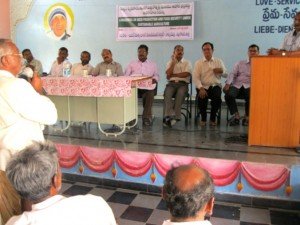 Nalgonda is the most backward district in Andhra Pradesh. Here people depend, in most cases, on agriculture for their livelihood. However, here agriculture is vulnerable to the vagaries of the monsoons. A good percent of this area is dependent on tanks and wells. The tanks and wells depend on rainfall which is often scant and uncertain resulting in poor crop yield. Most of the farmers and laborers are unorganized and looking for direction and skills. They are poor, illiterate, and suffer from want of adequate information, technological resources, and expertise to support them in their difficult situations.
Nalgonda is the most backward district in Andhra Pradesh. Here people depend, in most cases, on agriculture for their livelihood. However, here agriculture is vulnerable to the vagaries of the monsoons. A good percent of this area is dependent on tanks and wells. The tanks and wells depend on rainfall which is often scant and uncertain resulting in poor crop yield. Most of the farmers and laborers are unorganized and looking for direction and skills. They are poor, illiterate, and suffer from want of adequate information, technological resources, and expertise to support them in their difficult situations.
The conditions for farmers, specially the poor and the marginal farmers, and landless laborers, are very pathetic. Due to irregular monsoons the farmers are not able to cultivate or grow on their lands. There is not much available work for the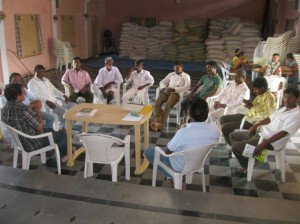 m. The conditions for landless laborers is even worse. Because of these conditions many of the poor must migrate to nearby towns and cities in search of work.
m. The conditions for landless laborers is even worse. Because of these conditions many of the poor must migrate to nearby towns and cities in search of work.
Formation of Farmers Association:
We help bring the farmers together into associations. The associations have a self help group for their personal development. The farmers are motivated and willing to form into associations. The association is the entry point for farmers to be trained on the various agricultural teachings.
MTRDS conducts awareness and motivational camps for poor and a marginalized farmers in the rural villages. The motivated farmers were formed into farmer co-operatives. There are 15 – 30 farmers in a co- operative. They meet once in a month to have their meeting and share their problems with peer farmers. So far MTRDS formed 59 groups with 587 farmers. MTRDS is trying to bring them together and start co-operative activities which will help the small and marginalized farmers. Moreover the farmers were encouraged to undertake seed production which they will market to the co-operative and receive a better price than they were getting. This co-operative studies the market price and sells when the market price is at the highest point. In that the co-operative spirit is induced among the farmers. The farmers are coming forward to put their contributions to undertake co-operative activities like sale of seeds, fertilizer and other agricultural implements. The main aim is to make available, quality and affordable price to the farmers.
operative. They meet once in a month to have their meeting and share their problems with peer farmers. So far MTRDS formed 59 groups with 587 farmers. MTRDS is trying to bring them together and start co-operative activities which will help the small and marginalized farmers. Moreover the farmers were encouraged to undertake seed production which they will market to the co-operative and receive a better price than they were getting. This co-operative studies the market price and sells when the market price is at the highest point. In that the co-operative spirit is induced among the farmers. The farmers are coming forward to put their contributions to undertake co-operative activities like sale of seeds, fertilizer and other agricultural implements. The main aim is to make available, quality and affordable price to the farmers.
Dry Land Agriculture:
In order to mitigate the drought problem the organization motivates and trains the farmers on dry land agriculture. MTRDS promotes dry land agriculture because it requires less water and minimum care for the crops. The organization is promoting dry land crops like horticulture, pulses (red gram, black gram, green gram etc.)oil seeds (castor oil, sun flower), bio-diesel plans etc.
MTRDS conducted training in 10 locations on dry land agriculture. 428 farmers participated. The key topics covered during the training were as follows, the concept of dry land agriculture, scientific management of soil and crops, selection of seeds, and intercrop cultivation methods.
Impact / changes: They are improving the dry land cultivation methods. They changed their mind set towards dry land agriculture. The small and marginalized farmers are choosing rain fed and dry land crops.
Seed Production:
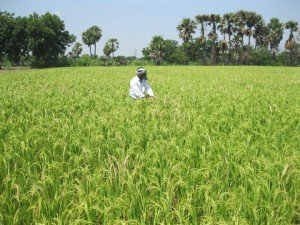 In order to supply the quality seed to the small and marginalized farmers MTRDS promoted Jeevana Jyothi Rythu Products and Marketing Mutually Aided Co-operative Society Ltd. by which the seed production and marketing is done. The JJRPM MACS Ltd brings the breeder seed of paddy (Rice) from The Agricultural university of Hyderabad. We conducted a training on dry land agriculture. We invited an expert from Krishi Vigyan Kendram, Gaddepalli as a resource person for that training. These seeds were distributed to the farmers free of cost. This process is continuing every year. The JJRPM has got all legal rights to produce the seed and market it using it’s own brand name is “Jeevana Jyothi Seeds”
In order to supply the quality seed to the small and marginalized farmers MTRDS promoted Jeevana Jyothi Rythu Products and Marketing Mutually Aided Co-operative Society Ltd. by which the seed production and marketing is done. The JJRPM MACS Ltd brings the breeder seed of paddy (Rice) from The Agricultural university of Hyderabad. We conducted a training on dry land agriculture. We invited an expert from Krishi Vigyan Kendram, Gaddepalli as a resource person for that training. These seeds were distributed to the farmers free of cost. This process is continuing every year. The JJRPM has got all legal rights to produce the seed and market it using it’s own brand name is “Jeevana Jyothi Seeds”
MTRDS conducted training in six locations on seed production. 335 farmers 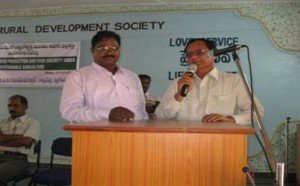 participated. The key topics covered during the training were as follows seed production process, stages of seeds, Varieties of seeds, spacing methods and cultivation techniques, IPM, Rules and regulations of seed act. We invited agriculture scientists from Agricultural University as resource persons.
participated. The key topics covered during the training were as follows seed production process, stages of seeds, Varieties of seeds, spacing methods and cultivation techniques, IPM, Rules and regulations of seed act. We invited agriculture scientists from Agricultural University as resource persons.
Impact / changes: The crop yielding was increased in Khariff season. The famers were also changed their attitudes and improved cultivation methods.
.
Field Inspection by the Seed Certification Officer: 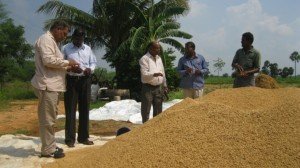
The senior seed certification officer from Telanagana state seed certification agency inspected our seed production program and verified the seed quality in the field.
The Agricultural coordinator is monitoring the field regularly. He facilitates the farmers to maintain the quality of the seed. We do take care while procure the seed from the farmers. We supply quality seed to the farmers of project area and others.
Seed Processing and Marketing
After harvesting of the paddy crops (Rice) JJRPM MACS procures the paddy from the farmers. The raw paddy is processed and the samples sent to the laboratory for testing. Later based on the results the certification agency provides the Tags (Labels) which prove they are authorized and the labels show the specifications of the results.
Then the seed bags will be stitched with Labels for marketing. The weight of the seed bag is 30 Kgs.
 ….
….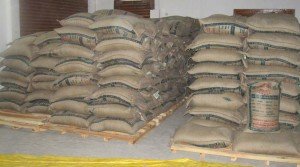
Seed Marketing:
MTRDS promoted community activities like seed marketing Super Bazar in the clusters. The main objective is to encourage the women in the business field and for them to learn economic transactions. The clusters have retail seed licenses from the Agricultural Department. There are four marketing outlets which are marketing the seeds like paddy(Rice), red gram, black gram, coriander, cotton etc…. before they buy seed they take indent from the members accordingly they put order to the companies. In this way the rural women are encouraged to undertake community activities. So that the members are get quality seeds on time at affordable price at door steps. The paddy (Rice) seed of JJRPM MACS Ltd is marketed through these clusters.

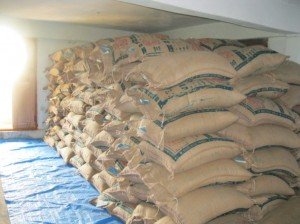
Genetically Modified Organism (GMOs):
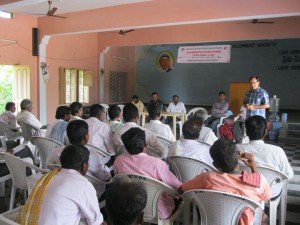 MTRDS conducted three training on GMOs. 153 farmers participated. The key topics covered during the training were as follows, concept of GMO, how GMOs crops affect the health of human beings, animals and analysis of its affects. We encouraged indigenous seed/ own seed production and modern methods in agriculture.
MTRDS conducted three training on GMOs. 153 farmers participated. The key topics covered during the training were as follows, concept of GMO, how GMOs crops affect the health of human beings, animals and analysis of its affects. We encouraged indigenous seed/ own seed production and modern methods in agriculture.
Impact / changes: Created awareness on GMOs. A few farmers changed their mindset and are now using non- GMO seeds. They realized the impact of GMOs on human health.
Organic farming:
MTRDS conducted six training classes on organic farming. 328 farmers participated. The key topics covered during the training were; concept of organic farming, use of vermi compost, use of bio pesticides, and the best practices of organic farming.
Impact / changes: The use of chemical fertilizer is reduced for the crops.
The seed production program of MTRDS:
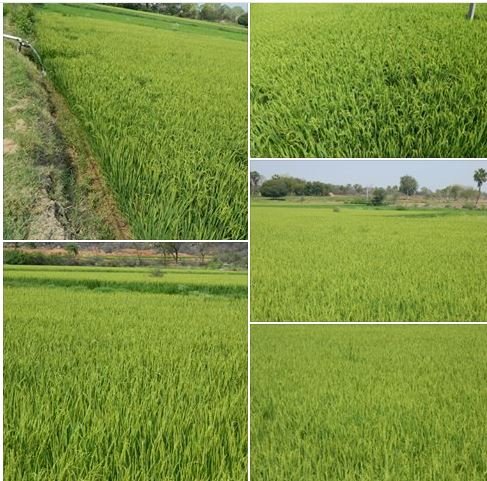 This is the paddy MTU 1010 variety as standing crop. This is going to be harvested by the end of April 2015. MTRDS procures this seed from the farmers and processes and packs for the farmers to be marketed by the farmers and women cooperatives. This is how we are promoting the seed production program among our poor and marginalized farmers.
This is the paddy MTU 1010 variety as standing crop. This is going to be harvested by the end of April 2015. MTRDS procures this seed from the farmers and processes and packs for the farmers to be marketed by the farmers and women cooperatives. This is how we are promoting the seed production program among our poor and marginalized farmers.

